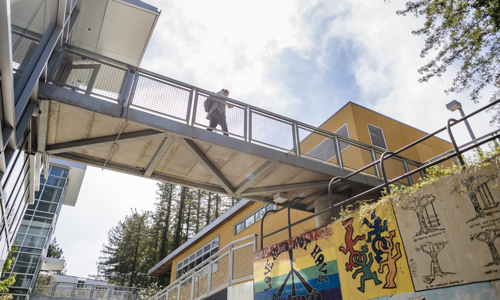Every year, to build the strongest and most diverse incoming class, UC Santa Cruz staff and faculty leaders work closely to determine who will be offered admission.
The work has succeeded with UC Santa Cruz admitting a cohort of students that reflects excellence and diversity. Nearly a third of admitted first-year students earned a GPA above 4.13 and 55 percent earned a GPA between 3.6 and 4.12. UC Santa Cruz also significantly increased the number of students admitted from low-income families, underrepresented groups, and those who will be the first in their family to earn a four-year degree.
UC Santa Cruz last year was ranked as a leading university for social mobility, just before it was invited into the highly-respected Association of American Universities, an organization comprised of the nation’s top research universities. Together, the dual honors underscore the campus’s excellence in research and dedication to student achievement and success.
“Our admitted cohort of students has already proven to be talented, well-prepared, and ready to take on whatever comes their way,” Chancellor Cynthia Larive said. “Our faculty and staff are dedicated to providing a vibrant and engaging experience for our new first-year students and transfer students, who have shown incredible strength and determination in pursuing their education despite all the challenges created by a global pandemic.”
More than 12,000 first-generation college students from California were admitted this year, and 11,895 of the admitted students are from low-income families, according to preliminary data released by the UC Office of the President.
UC Santa Cruz faculty ensure applicants are fully reviewed and assessed for their achievements within the context of their opportunities.
Underscoring its commitment to providing access to a high-quality education, UC Santa Cruz offered admission to a record number of California students for fall 2020.
The campus extended admission offers to more than 27,000 California seniors, a 35 percent increase over the previous year, and to more than 7,100 students attending a California community college, an 11 percent increase over the previous year.
The racial and ethnic diversity of admitted students increased this year. UC Santa Cruz extended offers to more than 1,100 African American high school seniors from California—a 42 percent increase from the previous year. Offers to first-year Chicanx/Latinx first-year students increased by 45 percent.
UC Santa Cruz continued its regional and statewide outreach efforts to increase interest and applications from transfer students who are seeking a four-year degree. Providing access for California community college students further diversifies our community.
UC Santa Cruz takes pride in creating a learning environment that supports cultural and geographic diversity. In support of that, the campus admitted 5,447 international first-year students and 3,248 first-year students from other states.
The broad diversity California, international, and out-of-state first-year and transfer students bring to campus enhances the community through their varied experiences and perspectives.
Like other University of California campuses, UC Santa Cruz is focused on supporting the health and well being of its campus community. The campus is planning to offer most of its fall courses through remote instruction, with a small number of in-person learning opportunities when fall classes start on October 1.
Incoming students will participate in a robust virtual Welcome Week intended to connect and engage students with each other and the campus. Welcome Week is a continuation of the Slug Orientation online courses, and is designed to further expose new frosh and transfers to vital resources that will support them in their academic and social transition. Through the mandatory college and major advising presentations they will meet staff and faculty from their affiliated college and major. During this week students will have many opportunities to meet other students via virtual activities and gatherings, be exposed to student clubs and organizations, and attend workshops that will connect them to work and internship opportunities.



